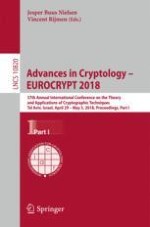2018 | OriginalPaper | Buchkapitel
Random Oracles and Non-uniformity
verfasst von : Sandro Coretti, Yevgeniy Dodis, Siyao Guo, John Steinberger
Erschienen in: Advances in Cryptology – EUROCRYPT 2018
Aktivieren Sie unsere intelligente Suche, um passende Fachinhalte oder Patente zu finden.
Wählen Sie Textabschnitte aus um mit Künstlicher Intelligenz passenden Patente zu finden. powered by
Markieren Sie Textabschnitte, um KI-gestützt weitere passende Inhalte zu finden. powered by
Abstract
-
Unruh (CRYPTO’07) introduced the pre-sampling technique, which generically reduces security proofs in the AI-ROM to a much simpler P-bit-fixing random-oracle model (BF-ROM), where the attacker can arbitrarily fix the values of \(\mathcal O\) on some P coordinates, but then the remaining coordinates are chosen at random. Unruh’s security loss for this transformation is \(\sqrt{ST/P}\). We improve this loss to the optimal value O(ST / P), obtaining nearly tight bounds for a variety of indistinguishability applications in the AI-ROM.
-
While the basic pre-sampling technique cannot give tight bounds for unpredictability applications, we introduce a novel “multiplicative version” of pre-sampling, which allows to dramatically reduce the size of P of the pre-sampled set to \(P=O(ST)\) and yields nearly tight security bounds for a variety of unpredictability applications in the AI-ROM. Qualitatively, it validates Unruh’s “polynomial pre-sampling conjecture”—disproved in general by Dodis et al. (EUROCRYPT’17)—for the special case of unpredictability applications.
-
Using our techniques, we reprove nearly all AI-ROM bounds obtained by Dodis et al. (using a much more laborious compression technique), but we also apply it to many settings where the compression technique is either inapplicable (e.g., computational reductions) or appears intractable (e.g., Merkle-Damgård hashing).
-
We show that for any salted Merkle-Damgård hash function with m-bit output there exists a collision-finding circuit of size \(\varTheta (2^{m/3})\) (taking salt as the input), which is significantly below the \(2^{m/2}\) birthday security conjectured against uniform attackers.
-
We build two compilers to generically extend the security of applications proven in the traditional ROM to the AI-ROM. One compiler simply prepends a public salt to the random oracle, showing that salting generically provably defeats preprocessing.
